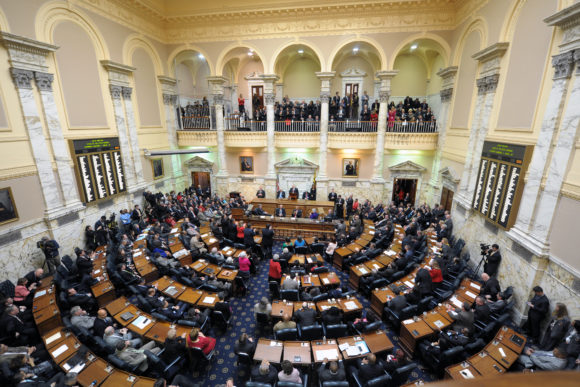By: Jenny Chen
1 in 4 teens miss school due to their periods. 1 in 5 teens struggle to purchase or could not purchase period products. Period poverty affects every girl of all ages. Currently, Maryland public schools does not officially provide accessible menstrual products for girls experiencing period poverty. Maryland could be providing free menstrual products to girls in public schools if a menstrual equity bill, known as HB0205, passes. The Maryland General Assembly is trying to pass a menstrual equity bill –HB0205 “Public Schools – Provision of Menstrual Hygiene Products”—once again in the 2021 Maryland General Assembly. This bill will provide free menstrual products such as pads and tampons to girls in primary and secondary public schools to ensure they obtain menstrual equity and education equity.
Last year, in the 2020 Maryland General Assembly, the menstrual equity bill sat at its first reading in the opposite chamber. Unfortunately, the bill did not pass due to the coronavirus pandemic. This year, in the 2021 Maryland General Assembly, the menstrual equity bill has passed both chambers and is now enrolled, meaning it being printed and presented to Governor Larry Hogan. This does not mean that the bill has passed yet, but Governor Larry Hogan has 30 days to decide.
Menstruation Impacting Education
There are many challenges associated with girls’ menstrual cycles. In many cases, young people would often skip school multiple days a month or even weeks. Not only this, but girls would go through extreme measures to find unsafe alternatives (such as using rags, socks, newspapers, and toilet paper) and prolong use of their menstrual hygiene product, to compensate for the lack of menstrual resources they have. These alternative methods and resources would lead to medical complications such as infections and gynecological issues.
One former student, Samantha Handwerk, unexpectedly had her period during her 6th grade year. She went to her nurse’s office but was encountered with a line of students who needed various medical attention. “Not wanting to ask in front of everyone, I ran back to the bathroom and shoved a pile of balled-up toilet paper in my underwear to hopefully soak up the blood until I got home,” Samantha Handwerk said.
Having accessible menstrual products readily available in public school restrooms would give girls a sense of privacy and comfort. Although there is nothing to be ashamed about having periods, forcing girls on their menstrual cycles to run around their school to find menstrual hygiene products creates shame that negatively impacts their mental health.
The menstrual equity bill will help thousands of girls in Maryland public schools. A testimony by Alinas Glass from Happy Period Baltimore said the following, “Baltimore City Public Schools have been underfunded for as long as they have existed. To provide these products for public school students would be winning a small battle in the overarching fight for funding. Even this seemingly small victory, however, would positively affect the lives of thousands.”
Breaking Stigmas
The menstrual equity bill would also help relieve the shame and stigma attached to being caught unprepared during a girl’s menstrual cycle. A testimony by Tina N. Dove, M.Ed., from Maryland State Education Association stated the following, “This legislation would have a tremendous positive impact on the lives of young Marylanders experiencing Period Poverty. It will also serve as welcomed relief for those who have experienced the shame and stigma associated with being caught “unprepared” when their menstrual cycle unexpectantly arrives while they are at school.”
In parallel, the University of Maryland’s Student Government Association has allocated $400,000+ towards supporting students during the pandemic. UMD’s SGA allocated $48,000 to provide free feminine hygiene products in restrooms across campus.
“It’s an exciting day for the student body and a step forward for ensuring students have the resources they deserve,” SGA President, Dan Alpert, said. Students of UMD would be able to have accessible period products that would lessen their struggle while pursuing a degree. UMD SGA’s budget is much smaller than the Maryland government’s budget. If a small-scale government body is able to provide menstrual equity to their students, it is possible for the larger-scale government to also do so.
The Cost is Worth It
There would only be a one-time cost totaling at least $504,600 in fiscal year 2022 and an additional funding of $604,900 by fiscal year 2026 if the menstrual equity bill passes. In total, it would cost approximately $1.0 million annually in fiscal year 2022. However, Delegate Kirill Reznik has noted that the cost would vary if schools decide to buy more affordable dispensers or not at all. If schools do buy more affordable dispensers, then the approximate cost may be lower than stated in the bill. Period poverty is experienced by every girl in every age. It is essential for the menstrual equity bill to pass to ensure gender equity and education equity for girls in Maryland public schools.
Sources:
- https://cdn.shopify.com/s/files/1/0795/1599/files/State-of-the-Period-white-paper_Thinx_PERIOD.pdf?455788 2 2.
- https://mgaleg.maryland.gov/2021RS/fnotes/bil_0005/hb0205.pdf 3
- https://today.umd.edu/articles/400k-sga-grants-support-students-through-pandemic-b04327ce-5fbc-474b-85eb 3a687b2d9a8 4
- https://www.slu.edu/news/2019/january/menstrual-products-access-research.php 5
- https://mgaleg.maryland.gov/cmte_testimony/2021/wam/1rwJGjaopfcucNnciACkLy7rRCzAcUsX7.pdf
- https://mgaleg.maryland.gov/cmte_testimony/2021/wam/13jyfeNG21c05SvQZysgfXZmV9pbdSA1Z.pdf 7
- https://mgaleg.maryland.gov/mgawebsite/Legislation/Details/hb0208?ys=2020RS






